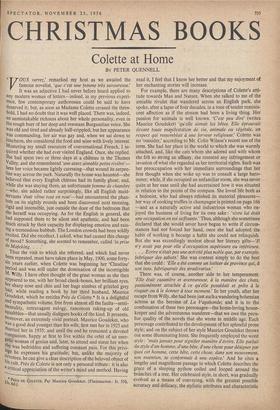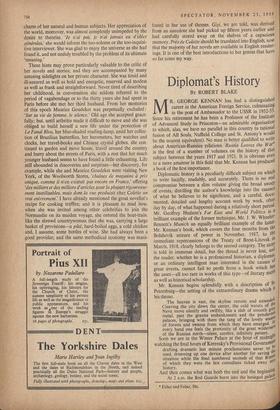CHRISTMAS BOOKS
Colette at Home
BY PETER QUENNELL V ' OUS verrez,' remarked my host as we awaited the famous novelist, 'que c'est une femme tres savoureuse: It was an adjective I had never before heard applied to any modern woman of letters—indeed, in my previous experi- ence, few contemporary authoresses could be said to have deserved it; but, as soon as Madame Colette crossed the thres- hold, I had no doubt that it was well placed. There was, indeed, an unmistakable richness about her whole personality, even in the rough burr of her deep and resonant Burgundian voice. She Was old and tired and already half-crippled; but her appearance was commanding, her air was gay and, when we sat down to luncheon, she considered the food and wine with lively interest. Mustering my small resources of conversational French, I in- quired whether she had ever visited England. Once, she replied. She had spent two or three days at a château in the Thames Valley, and she remembered 'une assez aimable petite riviere'— here her voice became lightly caressing—that wound its serpen- tine way across the park. Naturally the house was haunted—she believed that every English château had its family ghost; and, while she was staying there, an unfortunate femme de chambre —who, she added rather surprisingly, like all English maid- servants 'etait vetue tout en rose'—had encountered the phan- tom on its nightly rounds and been discovered next morning, rigid and insensible, just outside the door of the bedroom that she herself was occupying. As for the English in general, she had supposed them to be silent and apathetic, and had been in uch struck by their capacity for displaying emotion and rais- ing a tremendous hubbub. The London crowds had been wildly excited. Did she recollect, I asked, what had caused this change of mood? Something, she seemed to remember, called 'la prise de Itiafeking. . • .' Thus the visit to which she referred, and which had never been repeated, must have taken place in May, 1900, some forty- six years earlier, when Colette was beginning her 'Claudine' Period and was still under the domination of the incorrigible M. Willy. I have often thought of the great woman as she then appeared to me, with her broad cheek-bones, her brilliant eyes, her sharp nose and chin and her huge nimbus of grizzled grey hair, while reading a book by her third husband, Maurice Goudeket, which he entitles Pres de Colette.* It is a delightful and sympathetic volume, free from almost all the faults—senti- Mentality, extravagant eulogy, rancorous raking-up of old squabbles—that usually disfigure books of the kind. It presents, Moreover, an extremely vivid portrait. Maurice Goudeket, who Was a good deal younger than his wife, first met her in 1925 and married her in 1935; and until the end he remained a devoted ci3Mpanion, happy at first to live within the orbit of an ener- getic woman of genius and, later, to attend and nurse her when ,She was bedridden and suffering constant pain. For this privi- lege he expresses his gratitude; but, unlike the majority of a, evotees, he can give a clear description of the beloved object of .hi cult. Pres de Colette is not only a personal tribute : it is also cl critical appreciation of the writer's mind and method. Having ...___ "s 1,* PlIt.)S DE CoLETTE. Par Maurice Goudeket. (Flammarion: fr. 550, . 6d read it, I feel that I know her better and that my enjoyment of her enchanting stories will increase. For example, there are many descriptions of Colette's atti- tude towards Man and Nature. When she talked to me of the amiable rivulet that wandered across an English park, she spoke, after a lapse of four decades, in a tone of tender reminis- cent affection as if the stream had been a living thing. Her passion for animals is well known. 'C'est peu dire' (writes Maurice Goudeket) 'qu'elle aimait les betes. Elle gprouvait devant toute manifestation de vie, animale ou vegetale, un respect qui ressenzblait a laze ferveur religieuse.' Colette was no 'outsider,' according to Mr. Colin Wilson's recent use of the term. She had her place in the world to which she was warmly attached, and, like the cats whom she adored and with whom she felt so strong an affinity, she resented any infringement or invasion of what she regarded as her territorial rights. Such was her preoccupation with her immediate surroundings that her first thought when she woke up was to consult a large baro- meter; while, if she occupied an unfamiliar room, she was never quite at her ease until she had ascertained how it was situated in relation to the points of the compass. She loved life both as a hedonist, who had always relished its material pleasures— her way of cooking truffles in champagne is printed on page 166 —and as a naturally active and industrious woman who en- joyed the business of living for its own sake : 'vivre lui etait une occupation en soi stillisante; Thus, although she sometimes declared that she would never have begun to write if circum- stances had not forced her hand, once she had adopted the habit of working it became a habit she could not relinquish. But she was exceedingly modest about her literary gifts—V1 n'y avait pas pour elle d'occupation supgrieure ou inferieure. . . Ecrire n'etait pas une activite plus noble que, par exemple, fabriquer des sabots.' She was content simply to do the best that she could : 'Elle a iti comme un luthier de province qui, a son insu, fabriquerait des stradivarius.'
There was, of course, another side to her temperament. 'Elle etait casaniere et aventureuse, a la maniere des chats, passiongment attachge a ce qu'elle possedait et prete a le risquer ou a le dormer a tout moment.' In her youth, after her escape from Willy, she had been just such a wandering bohemian actress as the heroine of La Vagabonde; and it is to the combination of these two personages—the home-loving house- keeper and the adventurous wanderer—that we owe the pecu- liar quality of the novels that she wrote in middle age. Each personage contributed to the development of her splendid prose style; and on the subject of her style Maurice Goudeket throws out some illuminating hints. She frequently employed the word style : `mais jamais pour signifier inaniere d'ecrire. Elle parlait du style d'un homme, d'une bete, d'une chose pour designer par quoi cet homme, cette bete, cette chose, dans son mouvenzent, son maintien, se conformal' a une espece.' And he cites a lengthy and magnificent passage in which Colette describes the grace of a sleeping python coiled and looped around the branches of a tree. Her celebrated style, in short, was gradually evolved as a means of conveying, with the greatest possible accuracy and delicacy, the stylistic attributes and characteristic charm of her natural and human subjects. Her appreciation of the world, moreover, was almost completely unimpeded by the desire to theorise. 'Je n'ai pas, je n'ai jamais eu d'idies generales,' she would inform the too-solemn or the too-inquisi- tive interviewer. She was glad to enjoy the universe as she had found it, and not unduly troubled by the problem of its ultimate 'meaning.'
These hints may prove particularly valuable to the critic of her novels and stories; and they are accompanied by many amusing sidelights on her private character. She was timid and ill-assured as well as bold and energetic, reserved and modest as well as frank and straightforward. Never tired of describing her childhood, in conversation she seldom referred to the period of vagabondage or to the thirty years she had spent in Paris before she met her third husband. From her memories of this epoch Maurice Goudeket was perpetually excluded : 'Sur sa vie de femme, le silence.' Old age she accepted grace- fully; but, until arthritis made it difficult to move and she was obliged to build herself a new life under the protection of Le Fanal Bleu, her blue-shaded reading-lamp, amid her collec- tion of Brazilian butterflies, her barometers, her watches and clocks, her travel-books and Chinese crystal globes, she con- tinued to garden and move house, travel around the country and hurry about the streets of Paris, with a zest that her much younger husband seems to have found a little exhausting. Life still abounded in discoveries and surprises—her discovery, for example, while she and Maurice Goudeket were visiting New York, of the Woolworth Stores, 'chaines de magasins a prix unique, comme it n'ett existait pas encore en France,' offering 'des milliers et des milliers d'articles pour la plupart rigoureuse- ment inutilisables, mais dont la vile produisit chez Colette un vrai enivrement.' I have already mentioned the great novelist's recipe for cooking truffles; and it is pleasant to read how. when she was invited among other celebrities to join the Normandie on its maiden voyage, she entered the boat-train. like the shrewd countrywoman that she was, carrying a large basket of provisions—a pate, hard-boiled eggs, a cold chicken and, I assume, some bottles of wine. She had always been a good provider; and the same methodical economy was mani- felted in her use of themes. Gigi, we are told, was derived from an anecdote she had picked up fifteen years earlier and had carefully stored away on the shelves of a capacious memory. Pres. de Colette should be translated into English, now that the majority of her novels are available in English render- ings. It is one of the best introductions to her genius that have so far come my way.











































































 Previous page
Previous page